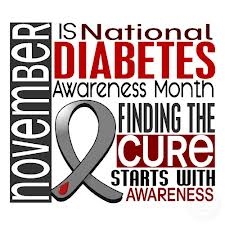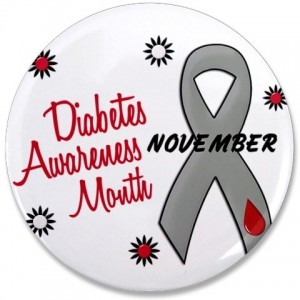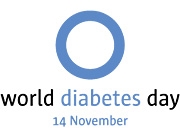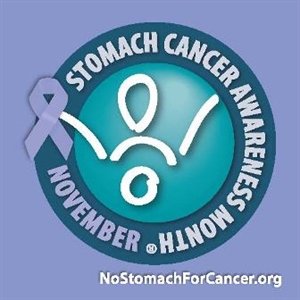National Diabetes Month on November, 2024: November is the month for what cancer awareness?
November, 2024 is National Diabetes Month 2024. National Diabetes Month Recap november national diabetes
As an Amazon Associate I earn from qualifying purchases.

November 14, 2013 is World Diabetes Day.
November 2013
* Pancreatic Cancer Awareness Month
* COPD Awareness month.
* Alzheimer's Disease Awareness Month.
* American Diabetes Month.
* Lung Cancer Awareness Month.
* Crohn's & Ulcerative Colitis Awareness Month
* National Stomach Cancer Awareness Month (United States)
* National Prematurity Awareness Month (United States)
* Epilepsy Awareness Month.
* National Pulmonary Hypertension Awareness Month.

Oral insulin with diabetes?
(m)
Oral Insulin Does Not Prevent Type 1 Diabetes
Insulin taken orally does not delay or prevent type 1 diabetes in people at moderate risk (25 to 50 percent likelihood) of developing type 1 diabetes in 5 years, researchers reported today at the annual meeting of the American Diabetes Association. The finding emerged from the second trial conducted as part of the Diabetes Prevention Trial-Type 1 (DPT-1), which ended last month. The other DPT-1 trial, completed two years ago, found that low-dose insulin injections failed to prevent or delay type 1 diabetes in people at high risk (50 percent or greater chance) of developing the disease in 5 years.
A total of 372 people took part in the trial comparing the rate of progression to type 1 diabetes among those randomized to take a daily capsule of insulin crystals (7.5 mg.) or a placebo consisting of a harmless, inactive substance. All participants had a 25 to 50 percent chance of developing type 1 diabetes in the next 5 years, a calculation based on genetic, immunologic, and metabolic tests done before enrollment. Upon joining the trial, which began in 1996, all subjects were making normal amounts of their own insulin. Their ages ranged from 3 to 45 years old, with a median age of 10 years.
After an average of 4.3 years of observation, about 35 percent of people developed type 1 diabetes in each group. The annual rate of onset (7.2 percent per year) was nearly the same in both groups. Testing done as part of the study detected most cases of diabetes before symptoms developed, enabling patients to get prompt, early treatment. No side effects were linked to oral insulin.
"This result is very disappointing, but it's important to remember that negative findings also provide important scientific answers," said study chair Dr. Jay Skyler of the University of Miami. "We've learned a great deal from both DPT-1 trials about the natural history of type 1 diabetes and the immune events that underlie it, and that knowledge is crucial to future prevention efforts." Although oral insulin did not prevent or delay diabetes, the study confirmed and expanded on the observations made in the low-dose insulin injection trial that the risk of developing diabetes can be predicted by subjects' characteristics and laboratory tests performed during screening.
The oral insulin study was based on the hypothesis that insulin taken orally might suppress the immune system's destructive attack on beta cells. Studies in the non-obese diabetic (NOD) mouse, an animal model of type 1 diabetes, had shown that oral insulin given before diabetes development could reduce or delay onset of the disease. By "feeding" a person insulin, the immune cells in the digestive tract might learn to recognize insulin in a different way and favor the development of immune responses that delay the onset or progression of diabetes or prevent its occurrence altogether.
The oral insulin trial is the third large study that failed to prevent type 1 diabetes in at-risk people. The European Nicotinamide Diabetes Intervention Trial (ENDIT) also failed to prevent or delay type 1 diabetes with nicotinamide, a vitamin present in small amounts in a normal diet.
"The findings of these trials underscore how much we still have to learn about the underlying immune events that lead to type 1 diabetes," said Dr. Judith Fradkin, director of the Division of Diabetes, Endocrinology, and Metabolic Diseases in the National Institute of Diabetes and Digestive and Kidney Diseases (NIDDK). "We plan to closely follow people at risk to try to understand the disease better and to find ways to stop the complex autoimmune process that leads to type 1 diabetes. We will also be testing approaches to preserve the ability to make insulin in people with newly diagnosed type 1 diabetes."
Upcoming clinical trials will be conducted under Type 1 Diabetes TrialNet, a collaborative network of clinical centers dedicated to preventing type 1 diabetes and preserving insulin production in new-onset patients. The first trials will begin enrolling patients in the fall of 2003.
About 17 million people in the United States have diabetes, the most common cause of blindness, kidney failure, and amputations in adults and a major cause of heart disease and stroke. About 1 million have type 1 diabetes. Formerly known as juvenile onset or insulin-dependent diabetes, type 1 diabetes usually begins in children and adults under age 30. It develops when the body's immune system attacks the insulin-producing cells of the pancreas.
The DPT-1 trials were funded by the NIDDK, the National Institute of Allergy and Infectious Diseases, the National Institute of Child Health and Human Development, and the National Center for Research Resources, all parts of the National Institutes of Health under the Department of Health and Human Services, as well as the American Diabetes Association and the Juvenile Diabetes Research Foundation International.

why are you supposed to wait until 4-6 months to introduce solids to a baby?
Wonderful question! :)
A babies gut isn't fully matured or 'closed' until 6 months.
Early introduction before their guts are closed can lead to food allergies, diabetes, and obesity later in life, among other problems.
The following organizations recommend that all babies be exclusively breastfed (no cereal, juice or any other foods) for the first 6 months of life (not the first 4-6 months):
* World Health Organization
* UNICEF
* US Department of Health & Human Services
* American Academy of Pediatrics
* American Academy of Family Physicians
* American Dietetic Association
* Australian National Health and Medical Research Council
* Royal Australian College of General Practitioners
* Health Canada
* Delaying solids gives baby greater protection from illness.
Although babies continue to receive many immunities from breastmilk for as long as they nurse, the greatest immunity occurs while a baby is exclusively breastfed. Breastmilk contains 50+ known immune factors, and probably many more that are still unknown. One study has shown that babies who were exclusively breastfed for 4+ months had 40% fewer ear infections than breastfed babies whose diets were supplemented with other foods. The probability of respiratory illness occurring at any time during childhood is significantly reduced if the child is fed exclusively breast milk for at least 15 weeks and no solid foods are introduced during this time. (Wilson, 1998) Many other studies have also linked the degree of exclusivity of breastfeeding to enhanced health benefits (see Immune factors in human milk and Risks of Artificial Feeding).
* Delaying solids gives baby's digestive system time to mature.
If solids are started before a baby's system is ready to handle them, they are poorly digested and may cause unpleasant reactions (digestive upset, gas, constipation, etc.). Protein digestion is incomplete in infancy. Gastric acid and pepsin are secreted at birth and increase toward adult values over the following 3 to 4 months. The pancreatic enzyme amylase does not reach adequate levels for digestion of starches until around 6 months, and carbohydrate enzymes such as maltase, isomaltase, and sucrase do not reach adult levels until around 7 months. Young infants also have low levels of lipase and bile salts, so fat digestion does not reach adult levels until 6-9 months.
* Delaying solids decreases the risk of food allergies.
It is well documented that prolonged exclusive breastfeeding results in a lower incidence of food allergies (see Allergy References and Risks of Artificial Feeding). From birth until somewhere between four and six months of age, babies possess what is often referred to as an "open gut." This means that the spaces between the cells of the small intestines will readily allow intact macromolecules, including whole proteins and pathogens, to pass directly into the bloodstream.This is great for your breastfed baby as it allows beneficial antibodies in breastmilk to pass more directly into baby's bloodstream, but it also means that large proteins from other foods (which may predispose baby to allergies) and disease-causing pathogens can pass right through, too. During baby's first 4-6 months, while the gut is still "open," antibodies (sIgA) from breastmilk coat baby's digestive tract and provide passive immunity, reducing the likelihood of illness and allergic reactions before gut closure occurs. Baby starts producing these antibodies on his own at around 6 months, and gut closure should have occurred by this time also. See How Breast Milk Protects Newborns and The Case for the Virgin Gut for more on this subject.
* Delaying solids helps to protect baby from iron-deficiency anemia.
The introduction of iron supplements and iron-fortified foods, particularly during the first six months, reduces the efficiency of baby's iron absorption. Healthy, full-term infants who are breastfed exclusively for periods of 6-9 months have been shown to maintain normal hemoglobin values and normal iron stores. In one study (Pisacane, 1995), the researchers concluded that babies who were exclusively breastfed for 7 months (and were not give iron supplements or iron-fortified cereals) had significantly higher hemoglobin levels at one year than breastfed babies who received solid foods earlier than seven months. The researchers found no cases of anemia within the first year in babies breastfed exclusively for seven months and concluded that breastfeeding exclusively for seven months reduces the risk of anemia. See Is Iron-Supplementation Necessary? for more information.
* Delaying solids helps to protect baby from future obesity.
The early introduction of solids is associated with increased body fat and weight in childhood. (for example, see Wilson 1998, von Kries 1999, Kalies 2005)
* Delaying solids helps mom to maintain her milk supply.
Studies have shown that for a young baby solids replace milk in a baby's diet - they do not add to baby's total intake. The more solids that baby eats, the less milk he takes from mom, and less milk taken from mom means less milk production. Babies who eat lots of solids or who start solids early tend to wean prematurely.
* Delaying solids helps to space babies.
Breastfeeding is most effective in preventing pregnancy when your baby is exclusively breastfed and all of his nutritional and sucking needs are satisfied at the breast.
* Delaying solids makes starting solids easier.
Babies who start solids later can feed themselves and are not as likely to have allergic reactions to foods.
Why delay solids?



















